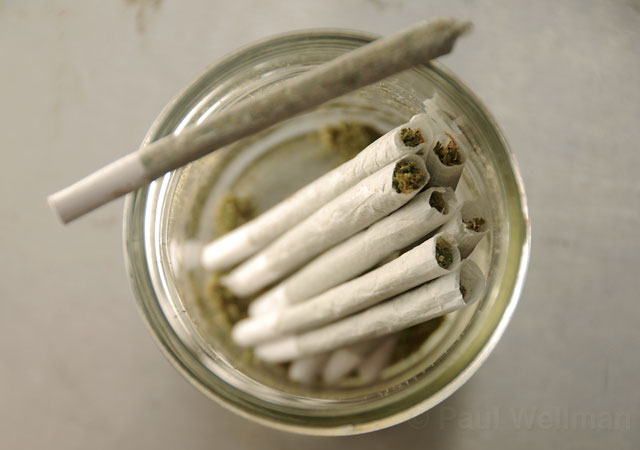Dope Days Are Over?
In Wake of Federal Raids, Santa Barbara Dispensaries Face Uncertain Future

It has been two weeks since federal agents, working in concert with local authorities, raided three different medical marijuana outfits on the South Coast and contacted landlords for 10 other operations in the area threatening property forfeiture lawsuits. Though no arrests were made during the sweeps, the efforts seem to have had their desired effect on Santa Barbara’s once blooming and booming dispensary landscape as the majority of clubs operating from Summerland to Goleta (a number that fluctuates from five to 12 depending on who you ask or how you define dispensary) have since shuttered their storefronts or simply stopped accepting new patients as they work to sell off back stock in anticipation of closing down later this month. Noting the initial success of their recent raids, Department of Justice (DOJ) spokesperson Thom Mrozek explained this week, “We certainly seem to have got the attention of people in the industry, and at least right now, our strategy appears to be working across our region.”
Raids and letter-writing campaigns are nothing new in the federal government’s war on medical marijuana in Santa Barbara. Multiple times in the past five years, folks from the DOJ and the Drug Enforcement Administration (DEA) have been part of raids as well as outreach to property owners who rent to clubs or dispensary-affiliated grow houses, the communication — both via letter and actual face-to-face meetings — essentially informing landlords that they are violating federal law by renting to these cannabis businesses and thus at risk of possibly having their property seized via a forfeiture lawsuit. Despite these sporadic efforts, as well as a baker’s dozen or so of raids and associated arrests (and convictions) by Santa Barbara Police and the Santa Barbara County Sheriff’s departments, several clubs, including a few of those on the wrong end of the raids, have remained operational. After all, thanks to 1996’s state Proposition 215 (aka the Compassionate Use Act) and 2003’s State Senate Bill 420, medical marijuana, though very much plagued by confusing and incomplete regulatory guidelines, is perfectly legal under state law in California for patients who have a note from their doctor.
This time around, however, it appears that the federal efforts have worked to shut down the dispensaries or, at the very least, get them to go underground. An informal survey of clubs in Santa Barbara County by The Santa Barbara Independent this week indicated that the businesses were either closed, on their way to being closed due their landlord giving them notice to vacate, exploring delivery service options, or just not commenting on the situation whatsoever. As the owner of one recently shuttered club opined anonymously, “It was a perfect storm: raids (not on us), actual lawsuits filed, and then a letter to my landlord that same week threatening basically the same thing — it is pretty hard to stay open after all that.”
According to Mrozek, the raids were anything but unexpected. Pointing to a press conference last October in which all four U.S. Attorneys from around California formally announced their coordinated plans to crack down on the medical cannabis industry, Mrozek explained that the Santa Barbara actions were simply the latest chapter in those ongoing efforts. “We are moving forward with our basic strategy of letters, lawsuits, raids, and in some cases, criminal charges,” summed up Mrozek Monday afternoon. “What happened 10 days ago was that we got to Santa Barbara County.” Mrozek added that, as far as his region is concerned, which covers seven counties from San Luis Obispo to Orange County, the Santa Barbara raids were the “fourth wave” of activity, coming after prior raids and letters in Orange and Riverside, as well as seven forfeiture lawsuits (more than half of which have already been settled) from those same areas. More sweeps are sure to follow, he said, especially in Los Angeles.
Of course, even without the increased federal heat, clubs operating within the City of Santa Barbara have been facing ever more stringent rules and regulations since the City Council adopted its Medical Marijuana Dispensaries ordinance nearly two years ago. One part of those rules — which also limit the total number of clubs in S.B. to three — is that a dispensary will lose its legal nonconforming status should it be closed for 30 or more days, a fact that is certainly on the minds of the owners and operators currently closing their doors or simply laying low until this latest round of trouble blows over. As for the potential of clubs to convert to delivery service from the typical brick-and-mortar operation, City Attorney Steve Wiley opined this week rather emphatically that such activity, in his current interpretation of the law and various court rulings, was illegal under both state and, obviously, federal law. Instead, he figured that operators on the South Coast were probably headed underground in the coming weeks, “kind of like prohibition in the 1920s,” he said.


